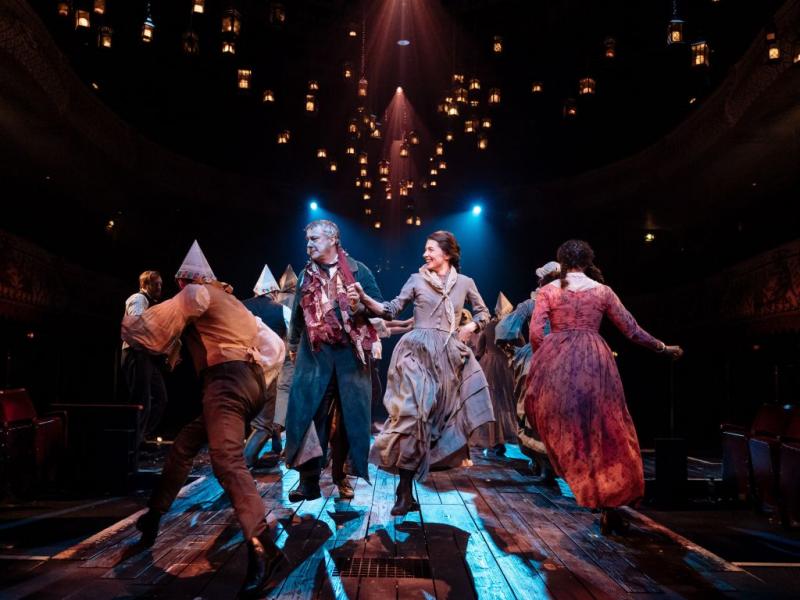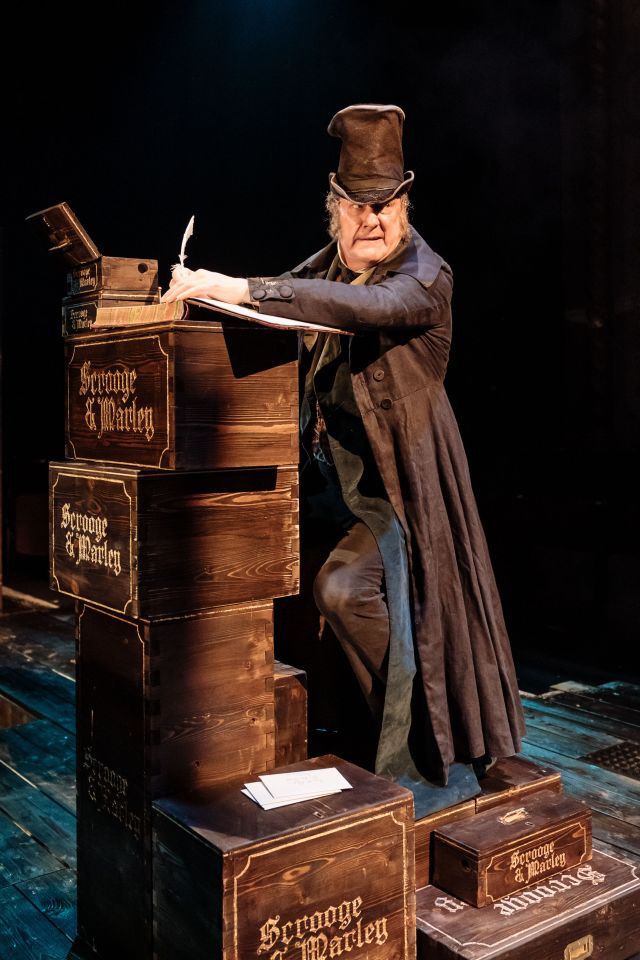A Christmas Carol, Old Vic review - Dickens adaptation returns, depth and mince pies intact | reviews, news & interviews
A Christmas Carol, Old Vic review - Dickens adaptation returns, depth and mince pies intact
A Christmas Carol, Old Vic review - Dickens adaptation returns, depth and mince pies intact
Last year's festive-season hit, re-cast, continues to enchant

The Old Vic's revival of its successful Christmas Carol first seen this time last year had me at the mince pies: they were served before curtain up by a Bob Cratchit figure while we admired the shoal of Victorian lanterns lighting the way over a cross-shaped stage that cuts the audience into quarters.
Matthew Warchus's production has all the bells and whistles, particularly the bells. The hand bells rung so tunefully by the cast are a Yuletide highlight, along with a sweet score of melodious interwoven carols, with the cast chiming in. I do have one reservation: let's face it, Scrooge's ordeal-by-ghost is a thoroughly pagan story, and to have him woken from sleep on Christmas morning with a hail of redemption's happy dawn, when Jesus hardly figures in this particular resurrection, makes for an odd juxtaposition. This is a story of the spirit of Christmas but not a holy one.
 A Christmas Carol carries that same slight sense of seasonal dread as The Nutcracker: that the adults are prepared to be bored by an oft-told story but hope the children won't be. Not so in Jack Thorne's version, which starred Rhys Ifans as Scrooge last year and Stephen Tompkinson (pictured right) in that same role now. There's been enough tinkering with Dickens's text to keep the curiosity up. Building a more important relationship with Scrooge's bullying father, it allows Tompkinson to impart modern shading to the role. No simple miser, this Scrooge comes with emotional baggage, and the Ghost of Christmas Past puts him through some heavy childhood immersion therapy. As he goes happily mad in the closing scenes, there's a hint that depressive miserableness might give way to a full-blown manic episode.
A Christmas Carol carries that same slight sense of seasonal dread as The Nutcracker: that the adults are prepared to be bored by an oft-told story but hope the children won't be. Not so in Jack Thorne's version, which starred Rhys Ifans as Scrooge last year and Stephen Tompkinson (pictured right) in that same role now. There's been enough tinkering with Dickens's text to keep the curiosity up. Building a more important relationship with Scrooge's bullying father, it allows Tompkinson to impart modern shading to the role. No simple miser, this Scrooge comes with emotional baggage, and the Ghost of Christmas Past puts him through some heavy childhood immersion therapy. As he goes happily mad in the closing scenes, there's a hint that depressive miserableness might give way to a full-blown manic episode.
With a fine felty face under a fine felt hat, Tompkinson has got the punch to hold the thing together despite occasionally ropey scripting. There's a lot to tell in a tight two hours, and poor old Scrooge barely has time to lie down before Morley comes knocking.
The production begs the question as to when Scrooge begins to turn, and why? With the help of Marley's ghost, might there be the suspicion that calculating old Scrooge sees the writing on the wall and pulls off a change of tune just in time? This version points toward a genuine change of heart through trauma relived and faced down.
We'll all have a baseline Scrooge by way of comparison: mine is the musical version, with Albert Finney. Tompkinson, for his part, quarrels nicely with the phantoms, who are all women (just like God but a bit sterner) and who take him on a tour of a land full of poverty and wretchedness, aka modern Britain. There's a moving encounter between the young Scrooge and the old, though a bit of puzzlement as to why Fezziwig should be an undertaker. Peter Caulfield lights up every scene as Cratchit, Eugene McCoy is suitably tousle-haired and well-intentioned as Fred, and Lenny Rush's Tiny Tim turns in all the dewy-eyed moments.
A good meaty programme fills out the interval – the real thing with a sharp essay on the novella by Dickens's great great great granddaughter, a well-honed charity appeal, and nice pics. The mince pies, by the way, were moreish to a fault: the production comes generously supported by Waitrose.
- A Christmas Carol at the Old Vic until 19 January
- Read more theatre reviews on theartsdesk
The future of Arts Journalism
You can stop theartsdesk.com closing!
We urgently need financing to survive. Our fundraising drive has thus far raised £49,000 but we need to reach £100,000 or we will be forced to close. Please contribute here: https://gofund.me/c3f6033d
And if you can forward this information to anyone who might assist, we’d be grateful.

Subscribe to theartsdesk.com
Thank you for continuing to read our work on theartsdesk.com. For unlimited access to every article in its entirety, including our archive of more than 15,000 pieces, we're asking for £5 per month or £40 per year. We feel it's a very good deal, and hope you do too.
To take a subscription now simply click here.
And if you're looking for that extra gift for a friend or family member, why not treat them to a theartsdesk.com gift subscription?
more Theatre
 Othello, Theatre Royal, Haymarket review - a surprising mix of stateliness and ironic humour
David Harewood and Toby Jones at odds
Othello, Theatre Royal, Haymarket review - a surprising mix of stateliness and ironic humour
David Harewood and Toby Jones at odds
 Macbeth, RSC, Stratford review - Glaswegian gangs and ghoulies prove gripping
Sam Heughan's Macbeth cannot quite find a home in a mobster pub
Macbeth, RSC, Stratford review - Glaswegian gangs and ghoulies prove gripping
Sam Heughan's Macbeth cannot quite find a home in a mobster pub
 The Line of Beauty, Almeida Theatre review - the 80s revisited in theatrically ravishing form
Alan Hollinghurst novel is cunningly filleted, very finely acted
The Line of Beauty, Almeida Theatre review - the 80s revisited in theatrically ravishing form
Alan Hollinghurst novel is cunningly filleted, very finely acted
 Wendy & Peter Pan, Barbican Theatre review - mixed bag of panto and comic play, turned up to 11
The RSC adaptation is aimed at children, though all will thrill to its spectacle
Wendy & Peter Pan, Barbican Theatre review - mixed bag of panto and comic play, turned up to 11
The RSC adaptation is aimed at children, though all will thrill to its spectacle
 Hedda, Orange Tree Theatre review - a monument reimagined, perhaps even improved
Scandinavian masterpiece transplanted into a London reeling from the ravages of war
Hedda, Orange Tree Theatre review - a monument reimagined, perhaps even improved
Scandinavian masterpiece transplanted into a London reeling from the ravages of war
 The Assembled Parties, Hampstead review - a rarity, a well-made play delivered straight
Witty but poignant tribute to the strength of family ties as all around disintegrates
The Assembled Parties, Hampstead review - a rarity, a well-made play delivered straight
Witty but poignant tribute to the strength of family ties as all around disintegrates
 Mary Page Marlowe, Old Vic review - a starry portrait of a splintered life
Tracy Letts's Off Broadway play makes a shimmeringly powerful London debut
Mary Page Marlowe, Old Vic review - a starry portrait of a splintered life
Tracy Letts's Off Broadway play makes a shimmeringly powerful London debut
 Little Brother, Soho Theatre review - light, bright but emotionally true
This Verity Bargate Award-winning dramedy is entertaining as well as thought provoking
Little Brother, Soho Theatre review - light, bright but emotionally true
This Verity Bargate Award-winning dramedy is entertaining as well as thought provoking
 The Unbelievers, Royal Court Theatre - grimly compelling, powerfully performed
Nick Payne's new play is amongst his best
The Unbelievers, Royal Court Theatre - grimly compelling, powerfully performed
Nick Payne's new play is amongst his best
 The Maids, Donmar Warehouse review - vibrant cast lost in a spectacular-looking fever dream
Kip Williams revises Genet, with little gained in the update except eye-popping visuals
The Maids, Donmar Warehouse review - vibrant cast lost in a spectacular-looking fever dream
Kip Williams revises Genet, with little gained in the update except eye-popping visuals
 Ragdoll, Jermyn Street Theatre review - compelling and emotionally truthful
Katherine Moar returns with a Patty Hearst-inspired follow up to her debut hit 'Farm Hall'
Ragdoll, Jermyn Street Theatre review - compelling and emotionally truthful
Katherine Moar returns with a Patty Hearst-inspired follow up to her debut hit 'Farm Hall'
 Troilus and Cressida, Globe Theatre review - a 'problem play' with added problems
Raucous and carnivalesque, but also ugly and incomprehensible
Troilus and Cressida, Globe Theatre review - a 'problem play' with added problems
Raucous and carnivalesque, but also ugly and incomprehensible

Add comment